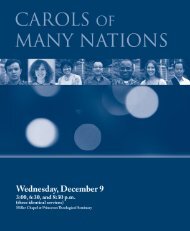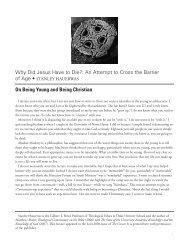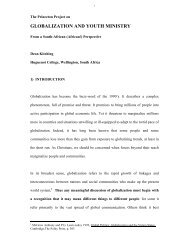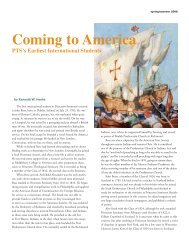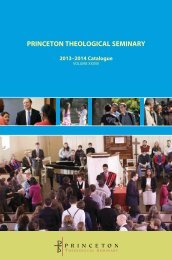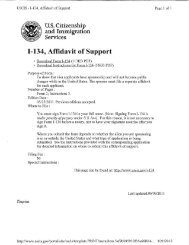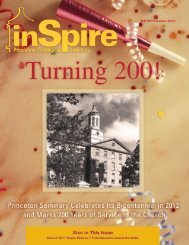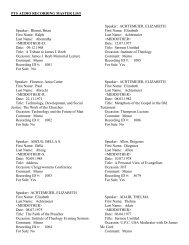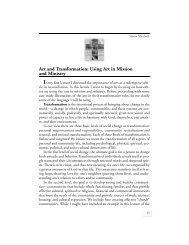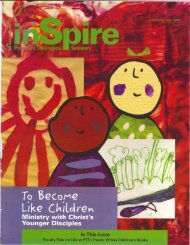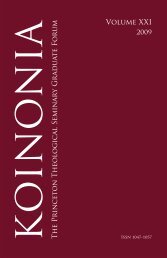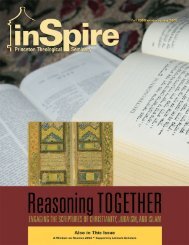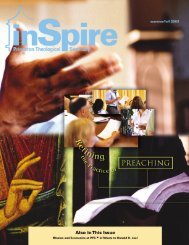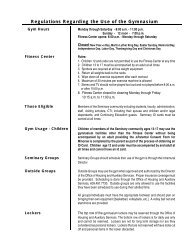P E R S P E C T I VAS - Princeton Theological Seminary
P E R S P E C T I VAS - Princeton Theological Seminary
P E R S P E C T I VAS - Princeton Theological Seminary
You also want an ePaper? Increase the reach of your titles
YUMPU automatically turns print PDFs into web optimized ePapers that Google loves.
Perspectivas/Occasional Papers • Fall 2006Perspectivas/Occasional Papers • Fall 2006me sirven de almohada (I carry my roots with me all the timerolled up I use them as my pillow.).” 2I concur with Fernando Segovia’s honesty about the situatednessof our theologies, reflected in his admission that “[a]t a fundamentallevel I have used my life story as a foundation for mywork.” 3 My migratory experiences are not accompanied by theconcomitant dangers and injustices lived by refugees and thoseamong us who lack the proper documents. This is thanks to decisionsmade by grandparents on both sides of my family whomade their journeys to insure their children would be bornand/or raised in the United States. But my family story is not allthat different from so many in this latest wave of migrations toNorth America. My Slavic father’s oldest brother came as a toddlerand earned his citizenship by serving in the U.S. Army andsurviving World War II. My uncle’s experience is not unlike anumber of the 30,000 plus foreign nationals in the U.S. militarytoday with dreams of becoming citizens through their service. Mymother’s parents detoured through Cuba from Spain, victims ofrevised U.S. immigration policies. They married and conceivedtheir firstborn in Cuba, and, like so many today, their migration tothe U.S. bears unexplained contradictions in documentation. Butfrom their journeys my inheritance includes a fondness for plátanos(sweet fried plantains), an inexplicable level of comfort inthe Spanish-speaking Caribbean, the word guagua 4 and theresponsibility to wear a white shirt as a sign of solidarity and as areminder to a commitment that transcends generations. 5Migrations are not objects of disengaged study, they are sources oftheological reflection that emerge from mi vida cotidiana (mydaily living). And as a Hispanic theologian, rooted in an appreciationof teología y pastoral de conjunto, I see no demarcationamongst theological disciplines that sets pastoral theology andpractical concerns as separate and secondary fields of study in thechurch and the academy.52One of the advantages of doing theology latinamente 6 is thatour recognition of lo cotidiano (the daily) as locus theologicusallows us to accept the reality that all theology is local. 7 Thereforeto reflect on migration abstractly, removed from the context of realpeople and communities in complex situations, is counterintuitiveand unproductive. Our local theologies arise from our communitiesof accountability, and we need to remember that in the contextof migration to, from and through the United States, Puerto Rico,Mexico and Canada our communities and churches comprisemigrants and their families, border patrol agents and federaljudges, politicians and policy-makers of all stripes, the conflictedand the xenophobic, the fearful and the threatened, minutemenand activists, companions and those struggling to live as goodneighbors. With this complexity of our communities in mind, Iwould like to focus on four challenges for theological reflectionand praxis latinamente; first, retrieving the lost memories of lasluchas (the struggles) from past migrations; second, cultivatingdynamic solidarity across difference; third, changing the languageand rhetoric that surrounds im/migration; fourth, avoiding thetemptation to spiritualize border-crossings.Retrieving Our StoriesAuthor A l f redo Véa, in his novel The Silver Cloud Café, poignantlydedicated to migrants, challenges the cultural amnesiathat plagues the United States:You must seek out remembrance, for ours is a land ofamnesiacs who pretend that there is no past; thatAmerica is a multi-cultural land when, in truth, it is ananticultural place that has ever been blessed with persistentand enduring cultures that have survivednever-ending efforts to drag them out of sight; pushthem out of mind; to imprison them in the past. 853



